Read the summary of the 2022-2023 annual report (PowerPoint presentation).
The year 2022-2023 was synonymous with change, but also with a steady increase in conflicts and extreme climatic events affecting populations on every continent. A 2023 report by the United Nations High Commissioner for Refugees indicates, in particular, that the number of displaced or refugee families has risen from 25 million in 2019 to over 100 million in 2023. Against this backdrop, our organization’s mission remains as relevant as ever.
Having been an active member of the Caritas Internationalis confederation for 25 years now, the global situation only strengthens our commitment and determination to tackle the causes of poverty, while responding to the emergencies affecting the most impoverished families on our planet.
In May 2023, Development and Peace ― Caritas Canada was able to send four representatives to the Caritas Internationalis General Assembly in Rome. Over 350 delegates and observers from 160 countries spent a week discussing global issues. The meeting ended with the election of a new president and secretary general. During the audience with Pope Francis, he reaffirmed that Caritas acts in the name of the Catholic Church to offer the love of Christ to those most in need. This stimulates us to continue our advocacy campaigns.
In the fall of 2022, we continued our People and Planet First campaign, calling on the Canadian government to hold Canadian mining companies operating abroad socially accountable for their actions. A total of 43,000 signatures were delivered to the Canadian Parliament. Of these, members of our organization collected 28,375 signatures and met with 50 Members of Parliament. As a follow-up to the Orientation Assembly held in June 2022, at which the major strategic directions for the next five years were chosen, we worked throughout the year to produce our 2023-2028 strategic plan.
After extensive consultation, the National Council also adopted new bylaws. This led to our first national Annual General Meeting being held online in February 2023. This historic event brought together 178 diocesan members.
We would like to take this opportunity to extend a special thank you to our network of members, donors and the Bishops of Canada. Your ongoing commitment, availability, active participation and support enable Development and Peace ― Caritas Canada to fulfill its mission.


President of the National council


Executive Director
President: Brenda Arakaza
(Francophone youth representative)
Vice-president: Tashia Toupin (West)
Treasurer: Danny Gillis (Atlantic)
Secretary: Frank Fohr (Ontario)
Member: Most Rev. Pierre Goudreault
(Bishop, Quebec)
Don Devine (Atlantic)
Gabrielle Dupuis (Ontario)
Simone Fournier (Quebec)
Most Rev. Jon Hansen (Bishop, West)
Most Rev. Peter Hundt (Bishop, Atlantic)
Reanne Laurie (Anglophone youth
representative)
Teresa McKerral (West)
Jason Noble (Quebec)
Boris Polanski (Quebec)
Most Rev. Pierre-Olivier Tremblay (Bishop, Ontario)


invested in overseas projects


in Africa, Asia, Eastern Europe, Latin America and the Middle East


in community development and humanitarian aid in34 countries


reached through overseas projects and programs
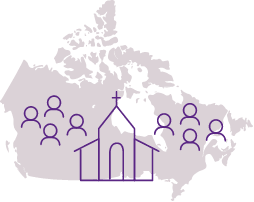

in over 60 dioceses across Canada


in 264 regional events across Canada.


in the D&P Schools Program and/or THINKfast events


received
Amount invested from September 1, 2022 to August 31, 2023 in the following regions:
From September 1, 2022, to August 31, 2023
Please note that we have revised the layout of our financial statements to improve clarity and transparency.


The democratic process calls for pursuing the path of inclusive, peaceful, constructive, and respectful dialogue among all the components of civil society in every city and nation.
— Pope Francis, address to diplomats, February 8, 2021
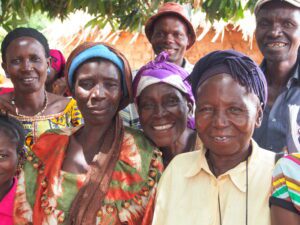

EEGIR aims for the greater inclusion of women and marginalized groups in the political life of the DRC through civic and electoral education campaigns; by reducing the educational, cultural and economic obstacles facing women; by mobilizing women in the 2023 and 2028 elections; and by monitoring inclusive governance. Among others, the program will reach 10 million women directly.
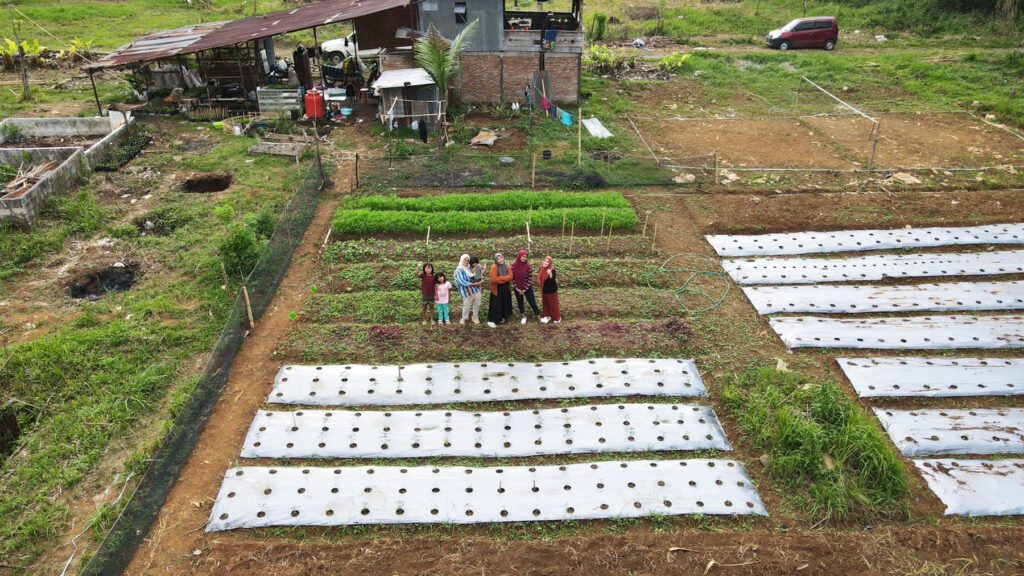

PAYOPAYO also aims to achieve a shared learning system and restore the spirit of collective work among villagers. This means that everyone works together, identifying common problems, looking for solutions and working collectively to implement them.
This year, PAYOPAYO launched a new “Learning Farms” or “Field Schools” project. By the end of the project in 2025, our partner expects that 250 young women and men will be able to act as community organizers and will have launched at least 20 collective actions for the sustainable development of their respective villages. This will entail the adoption of a new sustainable form of agriculture and/or alternative energy and the creation of at least 10 sustainable rural social enterprises belonging to these villages.
1 The word payopayo means “scarecrow” in the Mandar language. The figure of the scarecrow is a symbol of friendship with farming communities, as it protects the crops.
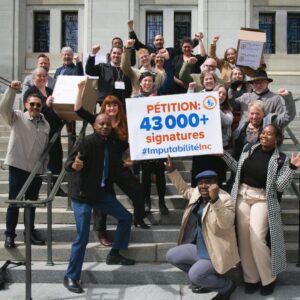

The next day, our executive director joined a civil society delegation to Parliament Hill that met MPs and presented them a petition signed by over 43,000 Canadians. Over half of those (28,375, to be precise) had been collected by Development and Peace ― Caritas Canada members during the People and Planet First campaign!
The petition called on the Government of Canada to adopt mandatory human rights and environmental due diligence
legislation for Canadian companies operating abroad, which would prevent, address and remedy human rights violations and ecological damage along the supply chain. Such a law could prevent abuses and other disasters like Rana Plaza.
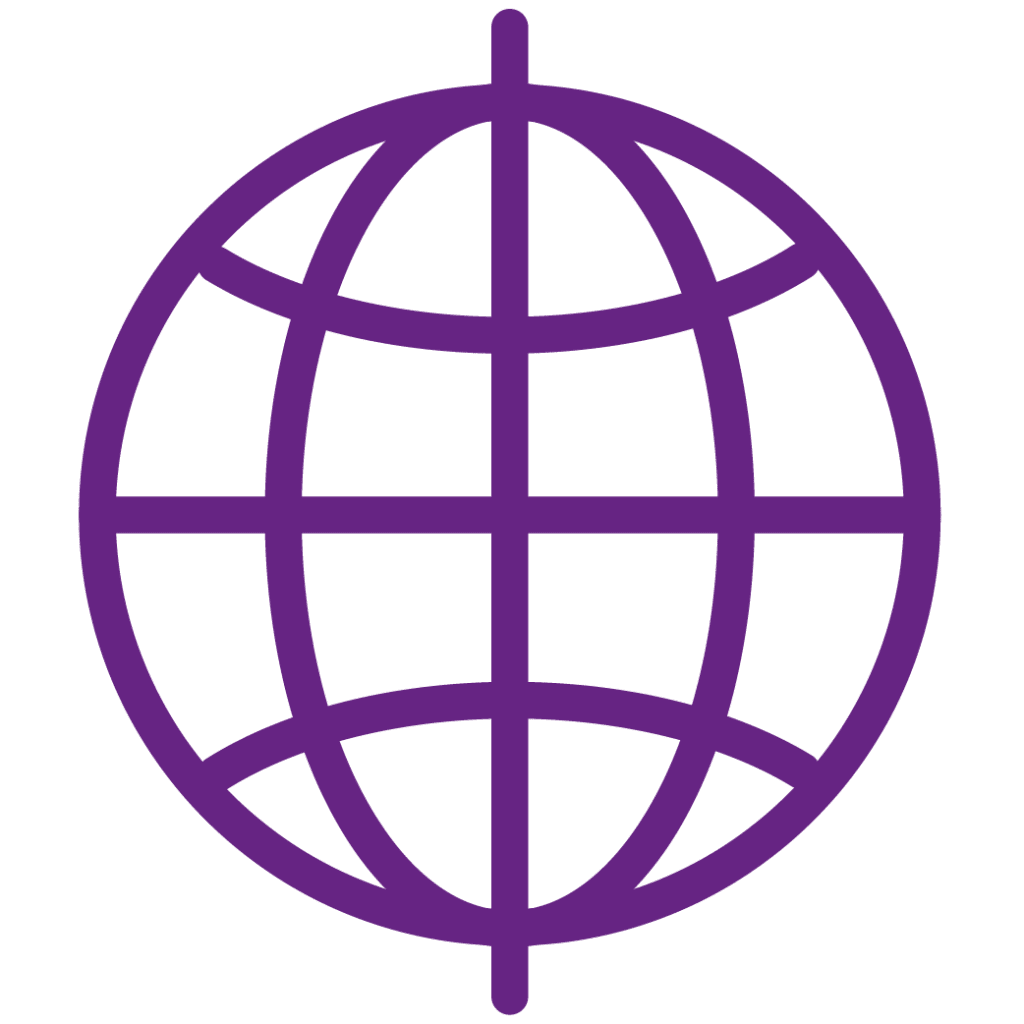

Some effects of the climate crisis are already irreversible, at least for several hundred years. We are now unable to halt the enormous damage we have caused. We barely have time to prevent even more tragic damage.
— Pope Francis, Laudate Deum, 15 and 16
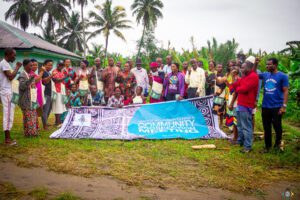

Our partner Health of Mother Earth Foundation (HOMEF) works on issues of climate justice, oil pollution and food sovereignty. This year, we supported the launch of Healing Our Land: Challenging Extractivism and Land Grabbing. This project seeks to protect and better defend the rights of farmers in the communities of Goi and Ibeno, in southern Nigeria, whose lands are threatened by the oil industry.
With the strengthening of the knowledge and capacities of communities in the target region, over 3,000 people will be able to report on and mobilize against the hidden impacts of extractive activities on their livelihoods. The project will amplify communities’ voices and put them in direct contact with policymakers.
By August 2023, HOMEF had met 50 representatives of the Eteo and Okoro-Utip communities to discuss the recent impacts of oil spills that have deprived communities of their farmlands and waterways. They also discussed implementing a community based environmental pollution monitoring project, participatory community research and direct advocacy actions.
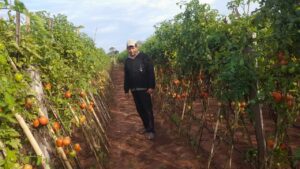

Our partner, the Pastoral Social Diocesana de Coronel Oviedo (PSCO), has set up a project to promote and strengthen the agroecological and environmental system with peasant families in its diocese. The project promotes collaboration between different districts for the defence of public policy and targets some 3,000 people from 460 families across six districts in the region.
It also helps farming families improve their production practices with alternative systems like agroforestry, fish farming and organic agriculture. These new practices enable families to feed themselves with their produce, and to conserve their environment. This ensures food security, economic viability and community resilience in the face of climate change and land grabbing.
Women’s, youth and adult groups run courses and workshops on various subjects, including advocacy and gender issues, to ensure equal participation in the project, livestock production, post-harvest management and new farming techniques. Families develop fair trade projects and improve their incomes by organizing small food fairs and setting up businesses.
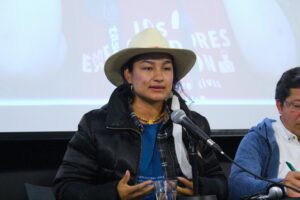

The star of our Share Lent campaign poster, Raquel Soto, an activist filmmaker working for our partner Asociación Campesina de Antioquia (ACA) in Colombia, was with us from March 17 to 30, 2023. Being the first solidarity visitor in five years, Raquel was eagerly welcomed by members at several events between Montreal and Moncton. Just 24 hours after landing, she addressed 300 people at a concert in aid of our organization at La Nativité Church in La Prairie, Que.
Raquel also showcased her creativity at the International Rendezvous seminar series at the Université de Montréal. At an event entitled Documentary Creation as a Tool for the Defence of Life and Territory in Colombia, she exhibited her intimate documentary, To Return to Myself. To conclude the Montreal leg of her tour, Raquel was one of the panelists at the event Du Sud EAU Nord: Les communautés locales au coeur de la défense de la vie et du territoire, organized as part of World Water Day.
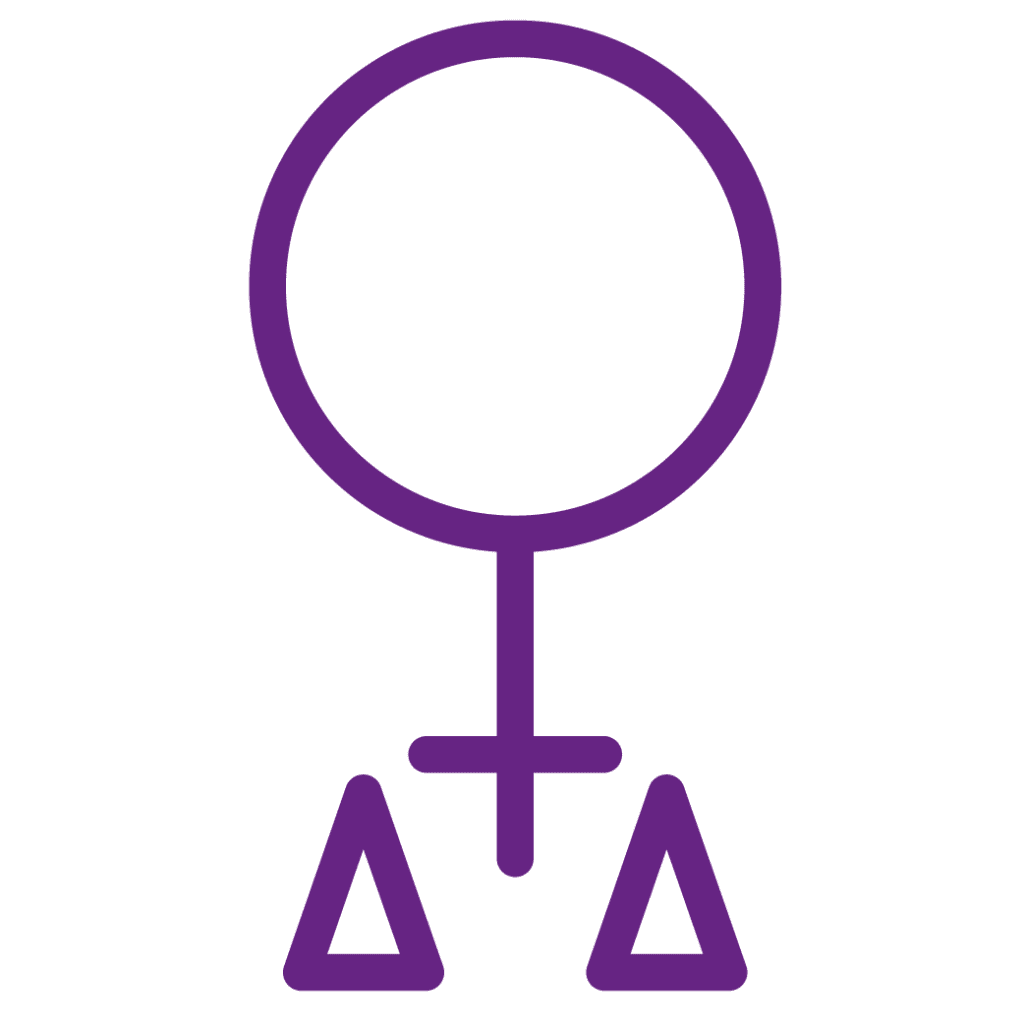

The growing presence of women in social, economic and political life at local, national, and international levels... is a beneficial process.”
— Pope Francis, June 9, 2017
In Haiti, almost a third of women have been victims of some form of gender-based violence (GBV). On the country’s southeastern coast, our partner Fanm Deside1 is tackling this issue head-on. Fanm Deside provides medical, psychosocial and legal assistance to women victims of GBV. They also train rural women to detect and prevent GBV, raise public awareness and promote positive male roles for husbands and fathers to reduce domestic violence. A temporary shelter for women in crises is also available.
Several events have been organized over the past year to raise awareness and prevent GBV. Notably, on the International Day for the Elimination of Violence against Women, Fanm Deside organized training activities with rural women in the Belle Anse region, where GBV is on the rise.
On Father’s Day, 40 men took part in an event that promoted positive male role models and aimed to encourage a greater paternal presence in children’s lives.
1 Fanm Deside means “determined women” in Creole.
Our partner, the Centro de educación y de promoción de la salud integral (CEPROSI, Center for Education and Promotion of Integral Health), plays a key role in the fight against gender-based violence (GBV). In the cities of La Paz and El Alto, immigrant women from rural areas find themselves with few opportunities for economic, technical, cultural, psychosocial and emotional development. They are therefore more likely to become victims of physical and sexual violence.
CEPROSI has set up the Women and Men Fighting Together projet against GBV. As members of 24 Sembrando Semillas1 centres, 600 women raise awareness of and combat various forms of GBV. Concrete activities that strengthen women’s individual and collective capacities make them more economically, emotionally and relationally autonomous. Under a Department of Justice mandate from the Court of La Paz, the project works with men indicted for assault to transform their notions of domineering masculinity and promote alternative models; to raise their awareness; to educate them; to extricate them from circles of violence; and to turn them into agents of anti-GBV change.
1 Sembrando Semillas means sowing seeds in Spanish.
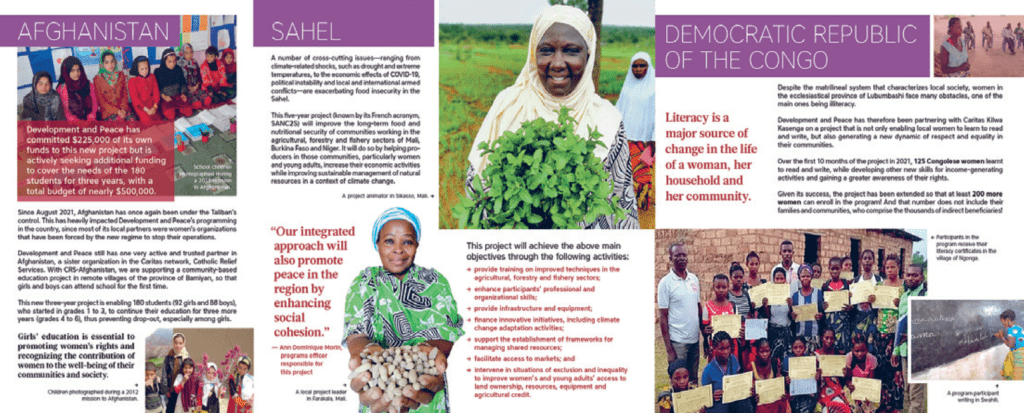

As part of our long-standing and successful 1% program, CWL members are invited to set aside one per cent of their discretionary spending to donate to our organization. These funds are tied to projects that improve the lives of women and children. Last year, over 70,000 women raised $29,485.30.
In the Democratic Republic of the Congo, the CWL’s support has allowed 200 women to take part in a functional literacy program with Caritas Kilwa Kasenga. This enabled them to develop income-generating activities in the fields of agroforestry, pastry-making and others.
CWL contributions also support a project that has restored 200 hectares of forest land to communities in the Sahel region by reclaiming arid agricultural and pastoral land in Niger, securing dunes in northern Mali and rehabilitating and reforesting village forests in Burkina Faso. This has made a major contribution to improving the food and financial security of women market gardeners and their families while strengthening environmental resilience.
We are very grateful for the CWL’s commitment and continued support.


Setting out on a journey of peace is a challenge made all the more complex because the interests at stake in relationships between people, communities and nations, are numerous and conflicting. We must first appeal to people’s moral conscience and to personal and political will. Peace emerges from the depths of the human heart and political will must always be renewed, so that new ways can be found to reconcile and unite individuals and communities.
— Pope Francis, January 1, 2020
Cambodia’s estimated 400,000 Indigenous people represent 2 to 3 per cent of the population. Recognition of Indigenous peoples, their rights and their land is a long and arduous process. The mechanism for obtaining indigenous communal land titling (ICLT) is extremely complex, involving 29 different steps with three different ministries.
Our partner Indigenous Community Support Organization (ICSO) has set up the Indigenous Land Rights Project to support 12,906 Indigenous people, including 6,529 women, from 22 target communities. ICSO uses the ICLT process to mobilize the community. This is how people learn to work and find solutions together, because each of the 29 steps represents a small victory, and obtaining land titles is a big reward.
In 2023, one community in Pa Tang obtained ICLTs equivalent to 623.91 hectares of land. These include residential land, agricultural land, spiritual land and funeral forest land. These lands are secured through the ICLT registration procedure and benefit 396 people, including 194 women, from 87 Charai Indigenous households, guaranteeing the further development of their community’s socioeconomic and cultural rights.
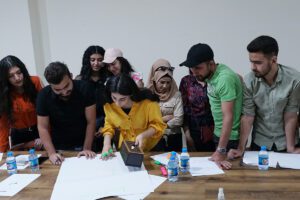

This year, engaging some 300 young activists in the Middle East, over half of whom were women, we supported more than 35 training and organizational coaching programs for their associations, as well as ten national conferences and eight local and national advocacy campaigns. In Beirut, five advanced-level participants of our programs also received academic and action-research training. These young people will become influential peacebuilders in their country and the region.
Our partners worked hard to highlight the role of young women peacemakers and community leaders. Women actively contributed to local dialogue for peace and discussed issues such as security and social justice with authorities, militiamen and religious leaders in their municipalities.
Young people were also involved in activities focussed on disarmament in Yemen; on intercommunity dialogue and inclusive citizenship in Syria; and on combatting corruption among elected officials and disabled people’s rights in Lebanon.


During the virtual rosary, our humanitarian aid project manager for the region gave an explanation and overview of the situation as reported by our partners. She also mapped the loss of human life and population displacement and summarized the effects of destabilization on agriculture, healthcare and humanitarian aid.
The rosary was recorded and sent to our Sudanese partners as a sign of Canadian solidarity. Volunteers recited five decades of the rosary in French, English, Arabic and Spanish. For each decade, a prayer intention was formulated in line with the concerns of the Sudanese population affected by the conflict.


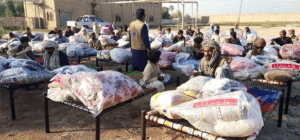

The year 2022 was synonymous with disaster for Pakistan. Between June and August, torrential rains and flooding caused an unprecedented national disaster. At the height of the floods, a third of the country was under water, 33 million people were directly affected and almost 8 million were displaced.
We answered the call of our partner Caritas Pakistan, and thanks to the generosity of our members, the Archdiocese of Toronto and the Manitoba Council for International Cooperation, we contributed $221,902 to their major reconstruction project.
This amount supported the needs of 9,828 households by providing food, water, hygiene and sanitation (WASH) services and housing assistance. In addition, 3,727 people from these households received medical and psychological support in eight medical camps, and 3,745 children were able to continue their education in temporary learning centers.
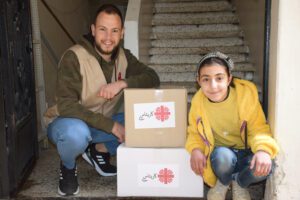

In Türkiye, we have been supporting the efforts of displaced people and tenants awaiting rehousing since March 2023. They are organizing to gain access to social housing cooperatives and to take part in housing and reconstruction solutions that are up to standard, sustainable and environmentally friendly.
In Syria since April 2023, we have been contributing to a large-scale Caritas Syria project supported by various Caritas Internationalis agencies. It aims to provide long-term support for 2,695 earthquake-affected households, comprising around 11,375 people. The project consolidates housing, provides health and education services and provides small multipurpose grants to help survivors meet their basic needs and live in dignity.
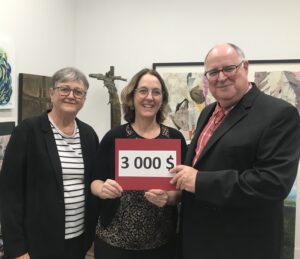

In the summer of 2023, the La Mosaïque exhibition space at the La Pocatière library hosted a cultural solidarity event in aid of the victims of the earthquakes that struck Türkiye and Syria in February 2023.
The La Clarté-Dieu gallery collective and our team from the diocese of Sainte-Anne-de-la-Pocatière organized the “Faire oeuvre belle” exhibition, featuring paintings donated by artists whose works open windows on the world to help us glimpse the future and nurture hope.
The exhibition, presided over by the Most Rev. Pierre Goudreault, Bishop of Sainte-Anne-de-la-Pocatière, raised $3,000 for Development and Peace ― Caritas Canada to help meet the needs of opeople in Türkiye and Syria.
“Artists speak loudly to the heart of humanity. They offer this possibility of touching individual and collective sensibilities, of arousing dreams and hopes.”
— Roger Chabot, priest-artist and animator of La Clarté-Dieu.


from 4,801 donors


worth $2,016,761


in the Solidarity Fund thanks to a new donation of $200,000
We welcome the 177 people who became Share Year-Round monthly donors during Share Lent 2023.
Benefiting from a matching fund set up by generous
donors and religious communities, their annual contribution of $71,000 has been doubled to $142,000.
We would also like to thank the 4,801 Share Year-
Round monthly donors who contributed $1,622,450 this year. Their commitment inspires us and gives us wings. Together, we fight for global social justice, unite our voices for peace and work for the dignity of every individual in solidarity with our partners.
Share Year-Round donors make a significant difference throughout the year. Their support not only drives our mission, it encourages us to continue our efforts to make the world a better place. They provide financial stability to our support for partners working in communities and strengthen our ability to respond rapidly to emergency relief.
Over the past year, we received $51,769 in gifts of
securities. This strategic choice by donors enables them to mitigate the tax impact of investments like stocks, bonds, term investments and mutual funds that have appreciated since their acquisition.
Whether from an individual or a management company, a gift of securities allows donors to contribute more while preserving liquidity. In addition to gaining full exemption from capital gains tax, donors get a receipt for their income taxes. This tax advantage is an excellent way for people to increase the impact of their support for the mission of Development and Peace ― Caritas Canada.
Our Solidarity Fund is the ideal means of providing long-term support to the causes we champion.
Donations to it are invested in perpetuity in accordance with the social teachings of the Catholic Church. A portion of the interest generated by these investments is used for the organization’s mission and enables us to better plan our many overseas programs. These investments are overseen by our Finance Committee. The Solidarity Fund currently holds $9,915,453.
By contributing to it, donors enable us to take on major long-term challenges that promote alternatives to unjust social, political, economic and environmental structures, while benefiting from a tax advantage.
This year, we asserted our presence in the traditional media and on the web, where we made significant gains in visibility.
Whether on social networks, thanks to the original content we published, or in the print media, thanks to interviews and positions on current events, we did not go unnoticed.
We appeared in the media to talk about our organization’s trajectory and to contribute to various topics. Various Canadian and American media outlets called our executive director or programs officers on 11 occasions to talk about issues ranging from Canada’s international humanitarian aid budget to the consequences of Meta’s news blackout.
Our website remains an excellent showcase for our work in Canada and around the world. In all, 58 articles and 35 press releases were published, and our webpages were viewed 374,000 times during the year.
Contact with the community is important to us, as evidenced by the 19 newsletters and special communications sent to our list of 32,395 people.
Our followers’ engagement rates have risen on social media platforms like Facebook, Instagram and X (formerly Twitter).
31,472 people are following us on social networks. Our handles are @DevPeace in English and @DevPaix in French.
Internationally, we took part in major events such as World Youth Day in Lisbon and the Caritas Internationalis General Assembly in Rome. One of our interns, Yusra Shafi, also represented us on a KAIROS Canada youth delegation to COP27 in Egypt.
We gratefully acknowledge the financial support of the Government of Canada, through Global Affairs Canada; of the Government of Quebec, through the ministère de l’Environnement, de la Lutte contre les changements climatiques, de la Faune et des Parcs and the ministère des Relations internationales et de la Francophonie; of the Manitoba Council for International Cooperation; and the Franciscans of Canada.
About us
Our work
Get involved
Ways to give
Resources
Get in touch
555 René-Lévesque Blvd. West, 8th Floor
Montreal (Quebec) Canada H2Z 1B1
Phone: 514-257-8711
Toll-free: 1-888-234-8533
Fax: 514-257-8497
Email: info@devp.org
Charity number: 1 1882 9902 RR 0001


Our international cooperation program is carried out in part with the financial support of the Government of Canada acting through Global Affairs Canada.
Development and Peace — Caritas Canada is the official international solidarity organization of the Catholic Church in Canada and the Canadian member of Caritas Internationalis.
Copyrights © 2024
Don’t miss anything about the work of our international partners or our awareness and mobilization campaigns.
Sign up now for our newsletter.